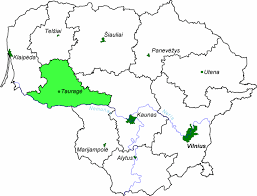
Lithuania’s Vilnius and Tauragė are on the list
The European Commission has announced the 100 cities that will participate in its Cities Mission to develop climate-neutral and smart cities by 2030. The 100 cities come from all 27 member states, with 12 additional cities in countries associated or with the potential of being associated to Horizon Europe, the EU’s research and innovation program.
Of the total 112 cities, 28 are in emerging Europe: Elbasan (Albania); Sarajevo (Bosnia and Herzegovina); Gabrovo, Sofia (Bulgaria); Zagreb (Croatia); Liberec (Czechia); Tartu (Estonia); Budapest, Miskolc, Pécs (Hungary); Liepāja, Riga (Latvia); Taurage, Vilnius (Lithuania); Podgorica (Montenegro); Krakow, Łódź, Rzeszow, Warsaw, Wrocław (Poland); Bucharest, Cluj, Suceava (Romania); Bratislava, Košice (Slovakia); Kranj, Ljubljana, Velenje (Slovenia).
The Cities Mission is set to receive 360 million euros of Horizon Europe funding over the next two years, to start their innovation paths towards climate neutrality by 2030. Research and innovation will address clean mobility, energy efficiency and green urban planning, and offer the possibility to build joint initiatives and ramp up collaborations in synergy with other EU programs.
 Benefits for the cities selected (chosen from 377 which applied) include tailor-made advice and assistance from a dedicated mission platform run by NetZeroCities – a four-year project to support European cities in cutting down greenhouse gas emissions, funded by Horizon Europe – additional funding and financing opportunities, and the possibility to join large innovation actions and pilot projects.
Benefits for the cities selected (chosen from 377 which applied) include tailor-made advice and assistance from a dedicated mission platform run by NetZeroCities – a four-year project to support European cities in cutting down greenhouse gas emissions, funded by Horizon Europe – additional funding and financing opportunities, and the possibility to join large innovation actions and pilot projects.
The mission also provides networking opportunities, the exchange of best practices between cities and support to engage citizens. Ursula von der Leyen, president of the European Commission, says the green transition is now making its way all over Europe. “These cities are showing us the way to a healthier future.”
The 100 selected cities will now need to develop Climate City Contracts, which will include an overall plan for climate neutrality across all sectors such as energy, buildings, waste management and transport, together with related investment plans. This process will involve citizens, research organizations and the private sector.
Urban areas are currently home to 75 per cent of EU citizens. Globally, urban areas consume over 65 per cent of the world’s energy, accounting for more than 70 per cent of CO2 emissions. The 100 EU cities chosen represent 12 per cent of the EU’s population. From emerging-europe.com





























